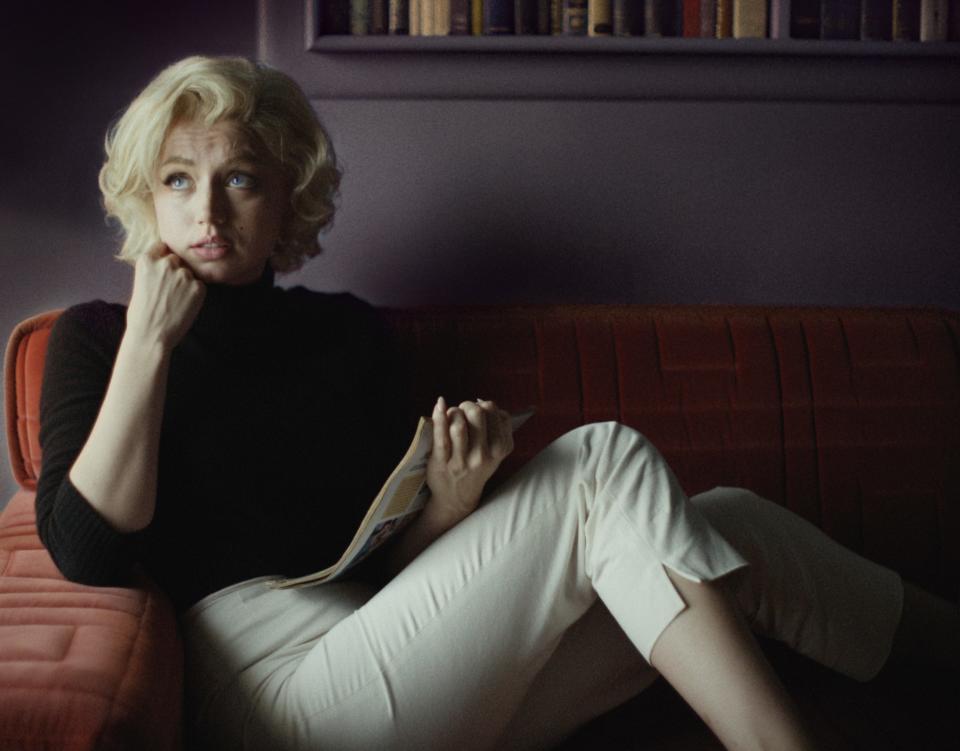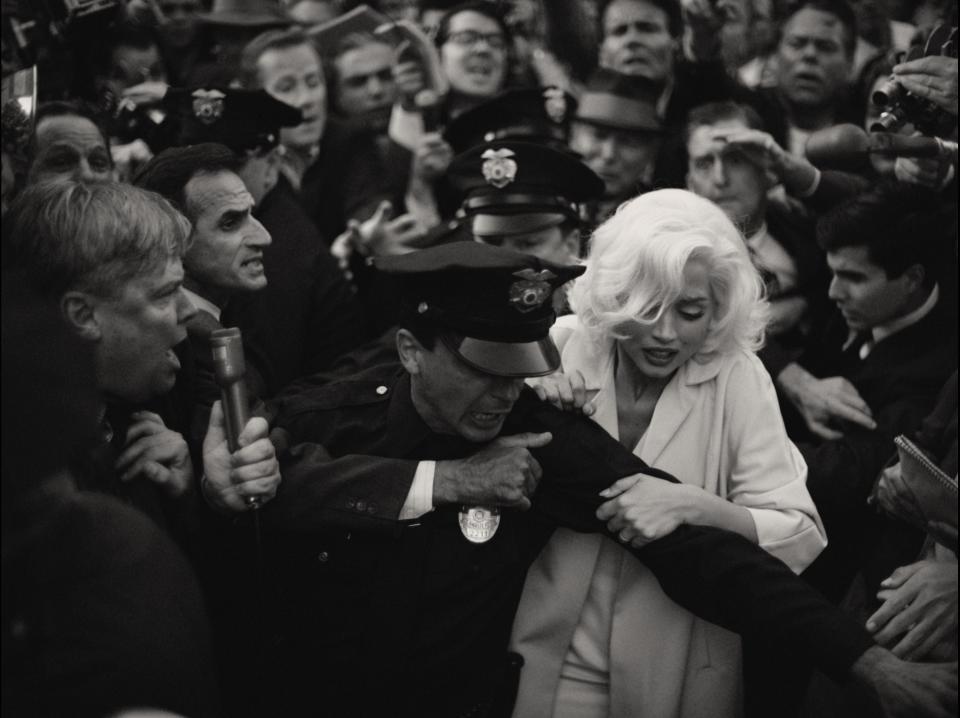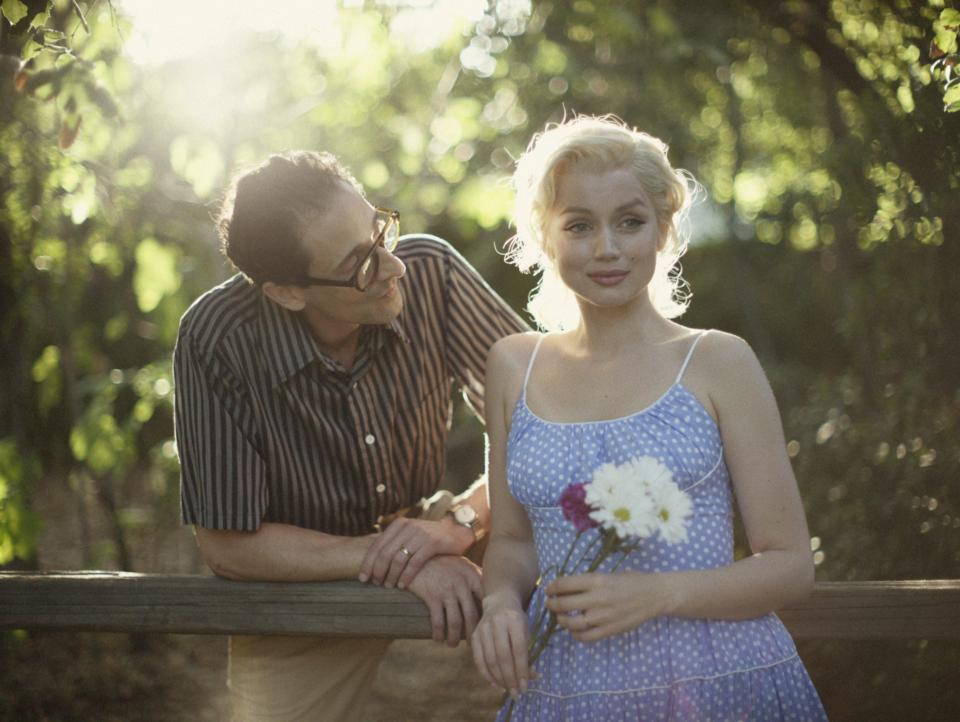'Blonde' review: Ana de Armas is a bombshell but Netflix's Marilyn Monroe movie is brutal misery
Like last year’s “Spencer,” “Blonde” aims to capture the horror show of a famous woman’s life. That's where the similarities end: Whereas the Princess Diana drama was a beautiful nightmare, the ballyhooed new Marilyn Monroe drama is brutal misery.
Written and directed by Andrew Dominik ("Killing Them Softly") – and slapped with an extremely adult rating – “Blonde” (★★ out of four; rated NC-17; streaming now on Netflix) finds Ana de Armas at her career best. She inhabits the iconic Hollywood bombshell in a fictionalized narrative that separates and explores her public and private personas.
Although there are insightful moments and surreal bits that pop, it’s overall a bizarre – and at nearly three hours, bloated – film that attempts to honor its subject and instead lets her down.
'Blonde': Everything we know about Netflix's NC-17-rated Marilyn Monroe movie

Based on the Joyce Carol Oates novel, “Blonde” introduces Norma Jeane as a 7-year-old girl who survives a traumatic event and is essentially orphaned when her mentally ill mother (Julianne Nicholson) is hospitalized and all she knows of her absent dad is a single picture. (We’ll get back to him in a minute.) The movie quickly shifts to adult Norma Jeane embarking on an acting career, adopting the Marilyn persona and having to submit sexually to a Tinseltown power player.
As Marilyn becomes a huge celebrity, Norma Jeane has difficulty keeping it together behind the scenes, struggling with drugs and her tumultuous love life. Norma Jeane’s relationships with men, for better and worse, are a key focus of the narrative momentum: There are her well-known husbands, of course – ex-Yankees slugger Joe DiMaggio (Bobby Cannavale), followed by writer Arthur Miller (Adrien Brody) – but also the constant. unnerving attention from leering male strangers. One headscratcher (of many): “Blonde” credits DiMaggio and Miller as The Ex-Athlete and The Playwright but they’re not named, unlike Cass Chaplin (Xavier Samuel) and Eddy Robinson Jr. (Evan Williams), two sons of classic movie stars involved in an early ménage à trois with Marilyn.
'It feels like serendipity': Ana de Armas' improbable transformation into Marilyn Monroe in 'Blonde'

Constantly waiting for her real father to show up, she’s a woman with daddy issues who calls her lovers “Daddy,” which is more infantilizing than it is endearing. De Armas gamely plays the character through a wide gamut of emotions and psychological breakdowns, including one weird scene where she has a conversation with a computer-generated image fetus. Dominik frequently puts the viewer in her dreamy, discombobulating perspective, yet Marilyn's torturous journey – involving so many crying jags – is equally painful to watch.
That said, a few of Dominik’s scenes astonish when using aspects of Marilyn’s mythology to examine larger themes of celebrity toxicity. Hollywood red carpets grow more hallucinatory and dreadful as “Blonde” rolls on, and the infamous subway grate sequence in “The Seven Year Itch” is shown with the actress grinning, men around her laughing in ecstasy at the sight of her steam-swept dress and underwear, and Cannavale’s retired ball player stewing.
10 must-see movies coming out this fall: From 'Hocus Pocus 2' to Dwayne Johnson's 'Black Adam'

The instance no one will soon forget is a sexual encounter involving Marilyn and The President – one guess as to which one – where her internal monologue wonders how she got there, really driving home the division between the main character’s dueling identities. Although de Armas spends a lot of time in a state of undress, the NC-17 rating seems like overkill and suggests a more hardcore movie than it actually is. (There are instances of sexual assault and abusive violence, but they’re more implied than seen.)
Armed with a strong performance from de Armas, Dominik’s film takes some big swings, and at times finds thoughtful nuance about a woman defined by pop culture and those around her. There is a really good Marilyn Monroe movie somewhere here, but it's woefully buried in a ruthlessly dour and joyless biopic.
Explained: The drama surrounding Harry Styles, Florence Pugh and 'Don't Worry Darling'
This article originally appeared on USA TODAY: 'Blonde' review: Ana de Armas' Marilyn Monroe Netflix movie is agony

 Yahoo Movies
Yahoo Movies 